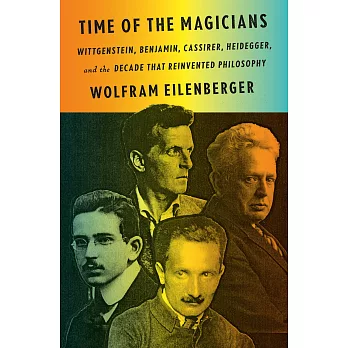1919年,第一次世界大戰才剛落幕,人們還深陷恐慌之中,正是迫切尋求心靈慰藉之際,也正是華特.班雅明、海德格、路德維希.維根斯坦、恩斯特.卡西勒等偉大思想家們面臨人生轉捩點之時。
班雅明的人生似乎註定就是一場悲劇,不符當世的前衛思想使其不被世人所接受;維根斯坦則與班雅明大相逕庭,出生於歐洲鋼鐵工業豪門的他,選擇繼承家業,致力於追求純粹的真理;海德格於戰時選擇服役以報效國家,後與胡塞爾結下不解之緣;卡西勒埋首於工作,寫下各類哲學著述,並於漢堡大學任教。這些偉大思想家們各自燃燒自己的生命,寫下劃時代的歷史篇章,影響後世深遠,然而第二次世界大戰的硝煙無情升起,帶領他們走向未曾預料的路途。
作者不僅探究這些偉大哲人的生命歷程,亦爬梳凱恩斯、漢娜.鄂蘭、羅素等當代重要經濟學家、政治家、記者及藝術家的生涯,以描繪這個由熱烈思想激盪出的精采盛世,並讓我們了解,那些看來晦澀難懂的學術是如何點亮我們的生活、照亮我們的世界。(文/博客來編譯)
A grand narrative of the intertwining lives of Walter Benjamin, Martin Heidegger, Ludwig Wittgenstein, and Ernst Cassirer, major philosophers whose ideas shaped the twentieth century
The year is 1919. The horror of the First World War is still fresh for the protagonists of Time of the Magicians, each of whom finds himself at a crucial juncture. Benjamin, whose life is characterized by false starts and unfinished projects, is trying to flee his overbearing father and floundering in his academic career, living hand to mouth as a jobbing critic. Wittgenstein, by contrast, has dramatically decided to divest himself of the monumental fortune he stands to inherit, as a scion of one of the biggest industrial families in Europe, in order to commit himself unswervingly to a life of the mind. Meanwhile, Heidegger, having managed to avoid combat in war by serving instead as a meteorologist, is carefully cultivating his career, aligning himself with the great Edmund Husserl, and renouncing his prior Catholic associations. Finally, Cassirer is working furiously on the margins of academia, applying himself intensely to his writing and the possibility of a career at Hamburg University. The stage is set for a great intellectual drama, which will unfold across the next decade. The lives and ideas of this great philosophical quartet will converge as they become world historical figures. But as the Second World War looms on the horizon, their fates will be very different.
Wolfram Eilenberger, internationally-bestselling author, stylishly traces the paths of these remarkable and turbulent lives, which feature not only philosophy but some of the most important economists, politicians, journalists, and artists of the century, including John Maynard Keynes, Hannah Arendt, and Bertrand Russell. In doing so, he tells a gripping story about some of history's most ambitious and passionate thinkers, as well as illuminating with rare clarity and economy their brilliant ideas, which all too often have been regarded as enigmatic or opaque.



 天天爆殺
天天爆殺  今日66折
今日66折 

























 博客來
博客來 博客來
博客來 博客來
博客來 博客來
博客來 博客來
博客來